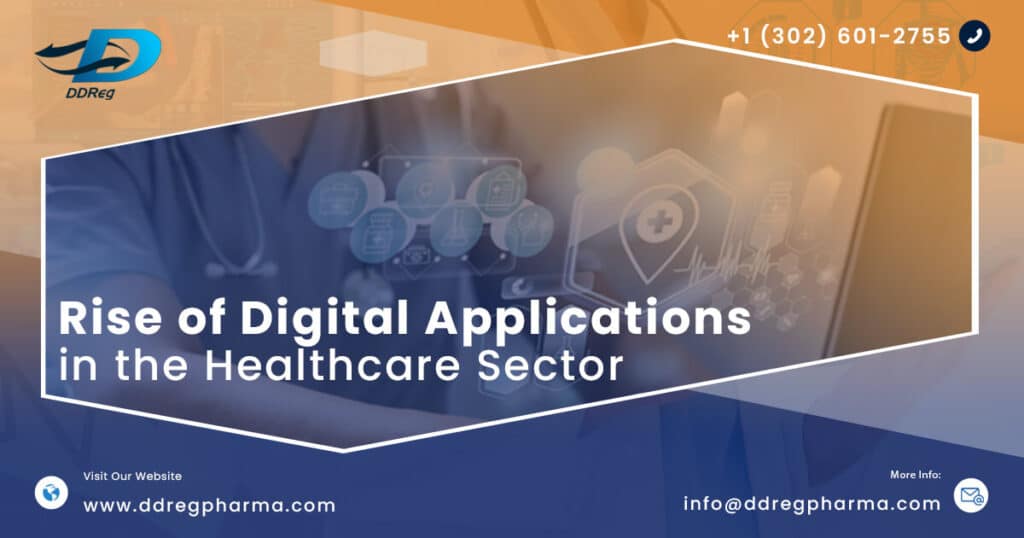The healthcare sector has been significantly impacted by technology, with the rapid growth of digital health applications projected to continue due to increased demand for remote healthcare services, especially during the COVID-19 pandemic [1]. According to the US FDA, software-based medical devices are increasingly being used for diagnosing, treating, and monitoring complex diseases. The adoption of artificial intelligence (AI) and the Internet of Things (IoT) in digital health applications is expected to drive growth further [2].
Germany’s Digital Health Application
In Germany, digital health applications, known as DiGA, have been approved for usage in the healthcare system by the German Federal Institute for Drugs and Medical Devices (BfArM) to support better patient engagement and disease management [3]. The app can be used by a patient alone or a healthcare provider & patient to facilitate disease recognition, monitoring, treatment, and alleviation. Essentially, BfArM considers these apps to be a ‘digital assistant’ to support patient and prescriber involvement. This made Germany the first country in the world to be able to prescribe digital apps, which can be prescribed by various healthcare professionals and are covered by the country’s statutory health insurance system.
It requires that the DiGAs must be a CE-marked medical device of the risk class I or IIa in accordance with EU Medical Device Regulation (MDR) or the transitional regulation Medical Device Directive (MDD). Following the success associated with DiGA, BfArM also introduced the digital nursing app (DiGA) that were intended to supplement each other.
BfArM has established a “Fast Track” for the approval, testing, piloting, and evaluation of these apps, which is accessible to all stakeholders within the European Union, to expedite the regulatory procedure surrounding digital health applications in order to support patient engagement [3]. Many of these health apps have successfully been approved and can be found in the DiGA directory, while others are currently awaiting approval. Examples of approved DiGAs include Deprexis, Selfapy, Elevida, Invirto, Velibra, Kalmeda, M-Sense, Rehappy, Somnio, Vivira, and zanado, each designed to address different medical issues [4].
Deprexis is applicable to depression, Selfapy for patients with eating disorders, Elevida assists multiple sclerosis patients, Invirto and Velibra help with panic disorder andKalmeda is used for behavioural tinnitus therapy. A recent review concluded that the DiGAs were favourable and seen as safer and more reliable options compared to conventional health apps [5]
The Federal Health Ministry in Germany expects that the number of medical problems supported by DiGAs will increase with the excellent response to DiGAs.
Regulatory Obligations for the Development of Digital Health Applications
Developers of digital health applications, also known as eHealth or health technology, must comply with various regulatory requirements depending on the country and region of use. Common regulatory obligations that must be considered include data privacy and security, adherence to medical device regulations, quality management, clinical validation, user interface and design, marketing and advertising, and professional responsibility. To ensure compliance, legal advice should be sought and regulatory authorities should be consulted.
What Issues Are Regulators Addressing With Software as a Healthcare Application?
Regulators from around the world have concentrated on resolving a number of challenges in light of the particular characteristics of Software as a Medical Device (SaMD) and the requirement for a uniform framework for fostering safe innovation and ensuring patient safety. The Software as a Medical Device Working Group(WG) was founded in 2013 by the International Medical Device Regulators Forum (IMDRF), a group of medical device regulators, to develop internationally recognized SaMD guidelines. Important definitions, a risk classification system, a quality management system, and guidelines for the clinical assessment of SaMD were developed by the WG.
What Effects Do Digital Health Applications Have on Pharmaceutical Companies?
Digital health applications can significantly impact pharmaceutical companies by improving drug development, enhancing patient engagement, increasing efficiency, providing new revenue streams, and facilitating collaboration between stakeholders. By leveraging digital health technology, pharmaceutical companies can gain valuable insights into patient needs and behaviours, streamline drug development, and develop new revenue streams. Additionally, digital health applications can improve patient engagement and collaboration, leading to better health outcomes and more effective partnerships.
Conclusion
The doctor-patient relationship could be positively changed by digital health solutions in a number of ways. Digital health technologies are being hailed as a possible answer in response to the growing need for individualized care and enhanced patient advocacy.
DDReg being a Regulatory consulting firm can assist digital health application developers in ensuring compliance with regulatory requirements. It can help organizations gain understanding of regulations and guidelines around digital health applications in Germany as well as other countries, wherever they are regulated. Additionally, they can review labelling and promotional materials for digital health applications to ensure compliance with regulatory requirements.
References and Further Reading:
- Haleem A, Javaid M, Singh RP, Suman R. Telemedicine for healthcare: Capabilities, features, barriers, and applications. Sensors international. 2021 Jan 1;2:100117
- US FDA. FDA Software as a medical device. United States Food and Drug Administration. 2018
- BfArM. DiGA: Digital Health Application. Federal Institute for Drugs and Medical Devices Germany. 2023
- BfArM. DiGA Directory. Federal Institute for Drugs and Medical Devices Germany. 2023
- Wangler J, Jansky M. Two years of approved digital health applications in Germany–Perspectives and experiences of general practitioners with an affinity for their use. European Journal of General Practice. 2023 Dec 31;29(1):2186396.

